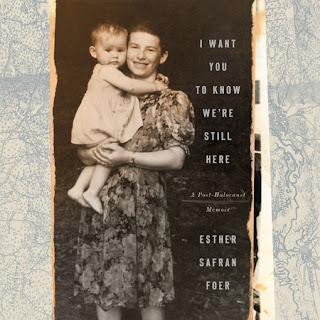I Want You to Know We’re Still Here: A Post-Holocaust Memoir
by Esther Safran Foer. © 2020. 242 pages.
I found this memoir to be confusing – I couldn't keep track of which relative was which. What can I say? - my concentration is shot these days. I decided to go with the flow, just soaking in the images and the events, without trying to keep track of the characters. Once I changed my reading style, I was able to get something out of the book.
The Foer family is way up there in the ranks of American intellectuals. From Wikipedia:
Albert Foer, a lawyer and president of the American Antitrust Institute,
Esther Safran Foer worked as press secretary for presidential candidate George McGovern. She founded public-relations firm FM Strategic Communications in 2002 and served as Executive Director of Sixth & I Synagogue from 2007 to 2016.
And their adult children:
Franklin Foer is a staff writer at The Atlantic and former editor of The New Republic, commentating on contemporary issues from a liberal perspective.
Jonathan Safran Foer is an American novelist. He is known for his novels Everything Is Illuminated, Extremely Loud & Incredibly Close, Here I Am, and for his non-fiction works Eating Animals and We Are the Weather: Saving the Planet Begins at Breakfast. He teaches creative writing at New York University.
Joshua Foer is the founder of Atlas Obscura and of Sefaria.
This is the first book I have read by someone in the family, although I frequently use Sefaria when attending torah study.
Esther Safran Foer shares her search for close family members whom she never
knew, because they were killed in the Holocaust. Her purpose is not just to find
them, but to memorialize them, and to learn about their lives in their small town
in Poland.
Both the Bible and Jewish tradition place great emphasis on the importance of names. Foer’s quest is spurred partly by the simple need for her to learn the name of her sister whom she never knew. It is a privilege not available to everyone to be able to know the names of previous generations.
One of the reasons the book was confusing to me is that people changed names, for instance when they emigrated, or were known by more than one name all along. It is a poignant moment when Foer discovers her sister’s name.
I had a revelatory moment near the end of the book that relates to me trying to reconcile myself to the loss of democracy that is likely to happen to us in the next few years.
In the biblical book of Exodus, before Moses ventures back to Egypt to free the Israelites, Moses asks God, What?! Who, me? I can’t free the people from Pharaoh! God replies, You’ll know that you will be able to do it, after you have freed the people and you come to worship me on the mountain.
Come on, now, God! That’s really nothing at all to go on – no proof for this moment, before attempting the difficult feats ahead. Moses is forced to have faith that he will, one day, be worshipping on the mountain with the freed people.
At the end of this book by Foer, as the family is burying the matriarch – the sole member of her immediate family who survived the holocaust – one of the grandchildren observes the large number of family members celebrating the long life of the matriarch, and says, “Take that, Hitler!” While Hitler & Co were able to inflict death and terror on many, including Foer’s immediate family, the Foer family’s subsequent generations are proof that Hitler’s small-minded vision of humanity did not ultimately win against that family.
Likewise, I am forced to believe that democracy will prevail, although it may take a long time to get there, and there may be a horrible detour, from which I wish I could spare my children and all children. (I’m trying to help us avoid that horrible detour, but I’m only powerful enough to do it when you join in the effort.) Moses did worship on the mountain, as God had promised. We must proceed with faith.
The rest of the books I finished during May 2021 at this link.

No comments:
Post a Comment